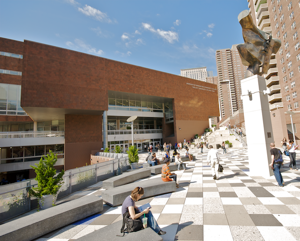
CUNY’s BMCC will receive $11 million in federal stimulus funding for an extensive environmental upgrade to its main campus building, at 199 Chambers Street, in Lower Manhattan.
Yielding $1 million in annual energy savings
When completed, the ten projects covered by the stimulus award are expected to reduce the college’s annual electrical energy consumption by more than 4 million kilowatts, while dramatically shrinking BMCC’s carbon footprint by approximately 5,400 metric tons of CO2. All told, the projects should yield more than $1 million in annual cost savings.
According to BMCC’s Vice President for Administration and Planning, G. Scott Anderson, the funds will be awarded as a sponsored capital project from the Mayor’s New York City Department of Energy Management, and will be used to greatly improve the energy efficiency of BMCC’s mechanical and electrical systems.
The project is described in an energy assessment commissioned by BMCC and CUNY, performed by Pelham, NY-based Genesys Engineering, under the auspices of the Dormitory Authority of the State of New York (DASNY) – who also funded the energy study. Design work is scheduled to begin in approximately 90 days and after the bidding awards are completed. The construction kick-off is projected to begin during the next academic year (Summer/Fall 2010). The total construction is projected to be completed in 18 to 24 months.
BMCC’s Pérez calls the energy efficiency project “shovel ready”
“This is a significant achievement, an important award, and a major milestone in the history of BMCC,” says BMCC President Antonio Pérez. “From the outset, we felt that the 199 Chambers Street project would be a prime candidate for federal stimulus funding, since it seeks to bring high levels of energy efficiency to a well-used, pre-existing government building.” In large part, the engineering study of cost savings and environmental impact identified in the Genesys report made this energy efficiency project a “shovel ready” capital program, which figured importantly in the stimulus award, he says.
The project will translate into a major energy conservation achievement
The Genesys-DASNY energy assessment calls for modernization of the steam turbines, water pumps, water chillers, HVAC (heating-ventilation-air conditioning) systems, building controls and new lighting throughout the Chambers’ Street building.
“There are significant energy, cost and environmental benefits associated with this project,” the report notes. In particular, the upgrades will produce tangible gains in heating and cooling efficiency, heat recovery, and heating and cooling performance, while extending equipment longevity.
Modernizing the HVAC system in the building’s Science labs will address deficiencies in the fume hood exhaust system, thus reducing the escape of toxic fumes and raising safety levels on the roof. Modernization of the building controls will improve overall comfort levels all through the building.
The reduction in BMCC’s carbon footprint in and of itself will translate into a major energy-conservation achievement. Notes the Genesys-DASNY report, “The annual carbon dioxide reduction is roughly equivalent to the annual CO2 production of 940 average passenger cars.”
A summary of the energy-efficiency projects covered by the stimulus funding includes:
1. Replacement of a steam turbine chiller
2. Air Handling Control Modifications throughout
3. HVAC Modifications of the Gym
4. HVAC Modifications of the Pool
5. HVAC Modification of the Theatres
6. Steam Insulation
7. Pool Cover
8. Lighting Modifications
9. Chiller Water Treatment
10. Science Lab HVAC Modification and exhaust
Click here to view the BMCC, Genesys-DASNY Assessment.

